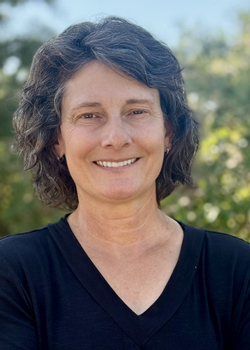
Dr. Nancy Gyurcsik (she/her)
Graduate Chair and Honours Chair and ProfessorHello, welcome to my faculty webpage. My preferred pronouns are she/her.
I am a Professor in the College of Kinesiology with research expertise in exercise psychology. I also teach in the areas of exercise psychology and social determinants of physical activity.
Reseach Area
Healthy aging and management of chronic conditions
Research Description
- Exercise psychology
- Psychosocial determinants of physical activity
- Self-regulation
- Positive psychology
- Knowledge translation
My research falls under the College of Kinesiology's research theme of "Healthy aging and management of chronic conditions."
Within this theme, I have expertise in exercise psychology. The overall aim of my research is to help people start and maintain physical activity as a non-pharmacological strategy to manage chronic disease. To achieve this aim, I conduct two programmatic lines of research.
First, I identify psychosocial determinants of physical activity using a complementary approach. This approach includes investigation of self-regulatory factors (e.g., barriers, self-regulatory efficacy beliefs), chronic disease-related factors (e.g., pain intensity, depression), and positive psychological factors (e.g., acceptance, resilience, psychological flexibility). This complementary perspective is unique, addressing real-world factors that can work together to impact participation in physical activity.
Second, I translate knowledge gained on psychosocial determinants into evidence-based community programming. For example, I lead research on the development and testing of a chronic pain and physical activity training for exercise professionals (fitness instructors, personal trainers).
The long-term aim of my research program is to promote the widespread adoption and delivery of sustainable evidence-based approaches in order to help adults better manage their chronic disease.
My research program has been supported by the Canadian Institutes of Health Research (CIHR), Saskatchewan Health Research Foundation (SHRF), Social Sciences and Humanities Research Council of Canada (SSHRC), and Saskatchewan Community Initiatives Fund. I have an active research lab (Russ Kisby Physical Activity and Health Promotion Lab). Graduate and undergraduate students are regularly and succesfully engaged in various research experiences (e.g., study design and conduct, data collection and analyses, presentations, manuscript writing). We work together to identify exercise psychology driven research questions that aim to solve real-world problems revolving around physical activity participation for chronic disease management. I also work with internationally recognized researchers in academic and community-based settings.
Interested in Graduate Studies?
If you are interested in pursuing graduate studies with Dr. Gyurcsik, please go to Graduate Training Opportunities for more information.
Courses Taught
- KIN 232.3 - Physical Activity in Society
- KIN 830.3 - Psychosocial Aspects of Health and Exercise Behaviour
Academic Background
- PhD (Exercise Psychology), University of Waterloo
- MSc (Sport Psychology), University of Windsor
- BSc (Movement Sciences), University of Windsor
News and Highlights
Active Living for Pain Website - Launched!
Our Active Living for Pain website is designed for adults living with chronic, their significant others, health care providers (e.g., medical doctors, physiotherapists, etc.) and physical activity providers (e.g., personal trainers, fitness class instructors, etc.).
You will find useful information on chronic pain and physical activity on our website. We also include tips and tricks for adults living with chronic pain to start and maintain their physical activity over time.
Why is activity so important? Being regularly active is a recommended strategy for adults to better manage their chronic pain!
Our website also includes current research opportunities. If you are interested in volunteering to be a participant in any active research we have going on, please check out our website!
Please visit our Active Living for Pain website here.
Or you can scan this QR code:

Social Media
Check out our some of our Active Living for Pain team members on Twitter:
Dr. Nancy Gyurcsik: @NancyGyurcsik
Kelly Corrine (KC) Hall: @KcHallCHES
Dr. Susan Tupper: @smtpt
Bart Arnold: @BartHuskie
Dr. Danielle Brittain: @dbritt14
Dr. Sean Locke: @theloctor
Publications
Example Publications
Brittain, D.R., Gyurcsik, N.C., Cary, M.A., Moser, E.N., *Davis, L.S. (2022). Differences in resilience mechanisms and physical activity among women experiencing chronic pain with higher or lower resilience. Women’s Health Issues, 32(3), 309-316. https://doi.org/10.1016/j.whi.2021.11.004 (*trainee of Dr. Brittain; Dr. Cary is a former graduate trainee of Dr. Gyurcsik)
Gyurcsik, N.C., Tupper, S.M., Brittain, D.R., Brawley, L.R., *Cary, M.A., Ratcliffe-Smith, D., *Blouin, J.E., *Marchant, M.G., Sessford, J.D., Hellsten, L.M., Arnold, B.E., & Downe, P. (2021). A proof-of-concept study on the impact of a chronic pain and physical activity training workshop for exercise professionals. Scandinavian Journal of Pain, 21(1), 112-120. https://doi.org/10.1515/sjpain-2020-0089
*Cary, M.A., & Gyurcsik, N.C. (2020). Differences in adaptive and maladaptive psychosocial responses to chronic pain among adults with varying physical activity levels. British Journal of Pain. https://journals.sagepub.com/doi/10.1177/2049463720942535
*Blouin, J.E., & Gyurcsik, N.C. (2019). Adults with conflicting or facilitation goals differ in adherence-related self-regulatory factors and exercise over time. Journal of Applied Social Psychology, 49(7), 416-425. https://doi.org/10.1111/jasp.12594
*Blouin, J.E., *Cary, M.A., *Marchant, M.G., Gyurcsik, N.C., Brittain, D.R., & **Zapski, J. (2019). Physiotherapists' intention to counsel clients with chronic pain on exercise: A focus on psychosocial factors. Physiotherapy Canada, 71(4), 319-326. https://doi.org/10.3138/ptc-2018-38
*Sessford, J.D., Brawley, L.R., *Cary, M.A., #Flora, P.K., *Blouin, J.E., Strachan, S.M., & Gyurcsik, N.C. (2019). Facing multiple barriers to exercise: Does stronger efficacy help individuals with arthritis? Applied Psychology: Health and Well-Being, 11(1), 59-79. https://doi.org/10.1111/aphw.12144
Brittain, D.R., Gyurcsik, N.C., Tupper, S.M., & Downe, P.J. (2018). Moving forward with physical activity: Self-management of chronic pain among women. Women’s Health Issues, 28(2), 113-116. https://doi.org/10.1016/j.whi.2017.12.006
= Graduate student trainee. # = Postdoctoral fellow. **Undergraduate student trainee
Complete Publication List
External Grant Funding
Dr. Gyurcsik's research program has been funded by various organizations, such as the Canadian Institutes of Health Research (CIHR), Social Sciencies and Humanities Research Council of Canada (SSHRC), Saskatchewan Health Research Foundation (SHRF), and Saskatchewan Community Initiatives Fund (CIF).
Funding Examples
Gyurcsik, N.C., Tupper, S.M., Arnold, B.E., Brittain, D.R., Halpape, K., Locke, S.R., McKellar, W., McKinnon, M., & Pond, J. Co-design and testing of a self-regulatory skills + physical activity intervention: Implementation outcomes and impacts on physical activity, pain management, and opioid use among Saskatchewan adults living with chronic pain. Saskatchewan Health Research Foundation (SHRF) Solutions – Impact Grant.
Purpose: To co-design a self-regulatory skills + physical activity intervention with adults living with chronic pain. Then, to examine the impact of the intervention on adults living with moderate to severe chronic pain on physical activity behaviour and pain management outcomes (e.g., pain intensity) at intervention end and 3-months post intervention.
Gyurcsik, N.C., Tupper, S.M., Arnold, B.E., Brawley, L.R., Brittain, D.R., Downe, P.J., & Hellsten, L.M. Exploring the effectiveness of an in-person integrated counselling training module to increase exercise providers' knowledge and beliefs to instruct and educate Saskatchewan adults with chronic non-cancer pain. Saskatchewan Health Research Foundation (SHRF), Collaborative Innovation Development Grant.
Purpose: To develop, test, and refine an exercise provider integrated counselling training module on chronic pain and exercise.
Gyurcsik, N.C.,Tupper, S.M., Brittain, D.R., & Brawley, L.R. Building a sustainable model to deliver chronic pain and exercise leadership training for Saskatchewan fitness professionals. Saskatchewan Community Initiatives Fund, Community Grants.
Purpose: To design and deliver a sustainably offered online workshop training on physical activity and chronic pain to Saskatchewan fitness professionals.
Highly Qualified Personnel (HQP): Graduate Student Trainees
Jocelyn Blouin, MSc: Jocelyn is a PhD student and former MSc student of Dr. Gyurcsik. She has been awarded a prestigious Tri-Council Doctoral Fellowship from the Social Science and Humanities Research Council (SSHRC) and a competitive University of Saskatchewan PhD Dean’s Scholarship for her graduate studies. Her emerging program of social psychological research is guided by theory and her passions to promote healthy lifestyles, physical activity adherence, and chronic health condition management. Overall, her research seeks to better understand psychosocial factors related to self-regulation of physical activity among adults. Her dissertation research is focused on psychosocial factors involved in adults’ decisions to engage in physical activity as a strategy to self-manage their chronic pain and live well.
Jocelyn has served as a Research Assistant during her graduate studies on several of Dr. Gyurcsik's externally funded research grants (e.g., Canadian Institutes of Health Research; Saskatchewan Health Research Foundation; Community Initiatives Fund). She also has an established record of refereed journal publications and regularly presents research at national and international scientific conferences.
Kelly Corrine (KC) Hall, MPH: Kelly Corrine (KC) Hall is a Certified Health Education Specialist with a passion for engaging with diverse communities towards health equity. KC is also a PhD candidate at the University of Saskatchewan. She received her Master of Public Health degree from the Colorado School of Public Health in 2016. KC has over five years of experience developing and implementing workshops and programs to diverse populations, including in the community and in the higher education setting. KC has expertise leading community engaged health initiatives including working with LGBTQ2S+ individuals and older adults. KC is the Project Coordinator for Dr. Gyurcsik's Active Living for Pain research program. KC works with Dr. Gyurcsik in coordinating all research activities and provides input on community engagement design and strategies. KC also assists in the facilitation of community engaged meetings and leads research team meetings throughout the grant cycle. Additionally, KC contributes to the translation of knowledge gained in our research by leading the development and maintenance of our Active Living for Pain website and social media accounts.
Graduate Training Opportunities
Interested in pursuing a PhD or MSc with Dr. Gyurcsik in the area of exercise psychology?
Do you have a broad interest helping people begin and maintain physical activity in order to manage their chronic disease (e.g., arthritis, chronic pain)?
Interested in identifying exercise psychology-based determinants of physical activity, with a focus on self-regulatory factors, positive psychological factors, and chronic disease-related factors?
Are you interested in translating reserach findings into programs offered in the community to help large groups of people be more active?
If you answered yes to any of these questions, send me an email (nancy.gyurcsik@usask.ca). Introduce yourself, including your general reserach interests and academic background that has prepared you to study exercise psychology.
You can also check out articles that our research group, including graduate students, have published. If accepted into the program, we will work together to identify a reseach program that is meaningful to you and that will contribute to what is known about helping people become more physically active.

